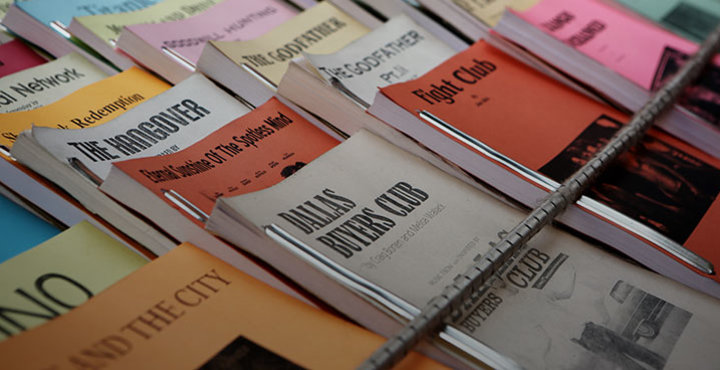Helpful tips to remember during the script writing process
You've got a great story idea, and you just know it will be perfect for the big screen. But now what? Perhaps this is your first attempt at script writing, or perhaps you already know how to write a screenplay—either way, we have a few tips that can help make script writing a little easier.
1. Know your craft
While this may seem like an obvious step in the script writing process, it is something that many writers forget. It’s great to read novels and non-fiction works, but if you are going to write scripts, well, you need to read scripts! Many online resources provide free access to professional scripts—the Internet Movie Script Database (IMSDb) is a great resource, and it has scripts for many recent movies and television shows—and it's worthwhile to spend some time reading over the work of other writers. Another step towards understanding the craft of script writing is to watch movies, plays, and television shows. The key, though, is not to watch passively; pay special attention to the dialogue, to the development of characters, and to how thoughts and feelings are conveyed.
2. Make a blueprint
Tempting as it may be, don't start the script writing process until you have an idea of the overall story. If you don't know how the story is going to end, then writing will often feel like a frustrating and futile exercise. Work out the wrinkles and story details before you begin; consider creating an outline for your script as part of the prewriting process. Your outline doesn't have to be detailed—although it certainly can be! A few sentences summarizing what is going to happen in each scene will be more than sufficient.
3. Speculation or shooting?
There are two main types of screenplays: a speculation (spec) script and a shooting script. A spec script is what writers use to sell their screenplays, whereas a shooting script is what a director or producer uses to shoot the movie or show. Do not write a shooting script! You don’t need to include camera angles or shot calling in spec scripts, nor should you include instructions on how the actors should deliver their lines. Concentrate on writing a great story with believable characters and dialogue.
4. Great dialogue takes practice
The hardest thing about script writing is that your dialogue has to convey almost everything; novel writers have the luxury of internal dialogue and descriptions to convey the story, as well as the thoughts and feelings of their characters. Script writers, however, don't have that option, and so dialogue must do the lion's share of the work—and good dialogue is hard to write! You can't write exactly as people talk in real life, and yet you still want your characters to sound realistic. How do you do this? Cut out the filler ("Oh, hi there, isn’t the weather great?") and get right to the meat of conversations; remember, for a play or movie, you only have a few short hours to tell your story. And don't be afraid of witty or snappy writing—people in movies are always funnier, wittier, and smarter than the people you meet on the street.
5. Action!
In script writing, action is what your characters do in a scene (for example: The writer tapped out a few lines, pausing to look out the window.). It's important to remember that, when writing action, these scenes are for a future movie, play, or television show—it will ultimately be seen and heard, not read. When writing action, leave out the internal emotion-centered descriptions explaining why your character is doing something (for example, the following is full of description that does not work in a script: The writer struggled to tap out a few lines, pausing to look out the window, thinking about her looming deadline, the trip she was planning to take, and how she ate too much at lunch.). If dialogue and action does not fully convey the internal thoughts of your character, then you must translate these thoughts into something visual or auditory. For example, a flashback might explain why a certain event was upsetting to your character.
Of course, the best tip any writer can receive is this: just write. Put away your fears and doubts, and put pen to paper! Once you’ve crafted your masterpiece, our script editors would love to go over it for you, eliminating grammatical errors and making sure it’s ready for the big screen.
Image source: Noom Peerapong/Unsplash.com



